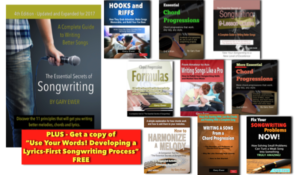If every song you write bears a striking resemblance to the ones that came before it, you’ll struggle to build on your fan base. That’s because your fans will think they’ve heard it all before, and start to lose the belief that you’ll come up with something different.
It’s tricky, though. For most singer-songwriters, if every song you write is radically different, they’ll find it hard to define you. And defining you is an important part of understanding you.
 If you’re trying to make your lyrics a much more important part of your songs, you need to read “Use Your Words! Developing a Lyrics-First Songwriting Process.” It’s part of “The Essential Secrets of Songwriting 10-eBook Bundle”, and right now, it’s FREE.
If you’re trying to make your lyrics a much more important part of your songs, you need to read “Use Your Words! Developing a Lyrics-First Songwriting Process.” It’s part of “The Essential Secrets of Songwriting 10-eBook Bundle”, and right now, it’s FREE.
So there’s a balance here: you want to give your listeners enough of what brought them to you in the first place, but also enough of something unique that they feel that it’s worth it to stick with you.
This kind of contrast can and should be done from song to song. In other words, give a good listen to the last song you wrote, and think about ways to change things up.
Here are some ideas:
- Change genre. This is one of the best ways to come up with something unique. In the midst of all the pop songs, throwing in something country, folk, classical, or anything else has the great side effect of potentially attracting new fans that have never heard your music before.
- Change tempo, and possibly time signature. Try to avoid the same tempo from one song to the next — that’s pretty easy to do. For time signatures, you’re likely writing in 4/4 time (alternating strong beat-weak beat patterns, like 95% of the songs out there). So you might consider trying 3/4 or some other “triple feel” song, like “Norwegian Wood” or even something complex, like the 7/4 you hear in Pink Floyd’s “Money.”
- Come up with different, more innovative song topics. Love still sells, but think about other things you can write about. If ideas elude you, imagine yourself in a conversation at a party with someone you’ve just met. You’re unlikely to talk about love in that circumstance (one assumes), so what would you talk about? Those may not be the things you’d choose, but they’d at least pull your mind in a new direction and make it easier to concoct some new topic.
- Change mode. If you’re always using major keys, switch to minor. If you find that hard to do, you’ll find it easier if you develop a major key progression and then change most of the major chords to minor, change minor ii-chords to diminished, and minor vi-chords to major.
- Change song form. Are you always using a verse-chorus-bridge format? Try one of the verse-only designs, or verse-bridge. Or try writing an instrumental track. Anything to keep your listeners guessing and entertained.
- Change instrumentation. One of the best ways to innovate in songwriting, if you aren’t going to change the actual way you write, is to try something completely different with regard to instrumentation. If you’re a guitarist, it’s likely that most of your songs are going to be guitar-based. If you feel competent with technology, you can do up a string quartet backing track, as The Beatles did on “Yesterday”, or even something orchestral, as Adele did in “Skyfall.”
The “and-now-for-something-completely-different” approach will pay off because most of the ideas listed above don’t require you to change your writing style. They just require you to nudge yourself a little out of your typical comfort zone and give your listeners a little bit of surprise.
And with each change up comes the opportunity to build on your fanbase and increase the number of people who look to you to be creative and imaginative.
 Written by Gary Ewer. Follow Gary on Twitter.
Written by Gary Ewer. Follow Gary on Twitter.
 “The Essential Secrets of Songwriting” eBook bundle includes“Writing a Song From a Chord Progression”. Discover the secrets of making the chords-first songwriting process work for you.
“The Essential Secrets of Songwriting” eBook bundle includes“Writing a Song From a Chord Progression”. Discover the secrets of making the chords-first songwriting process work for you.










